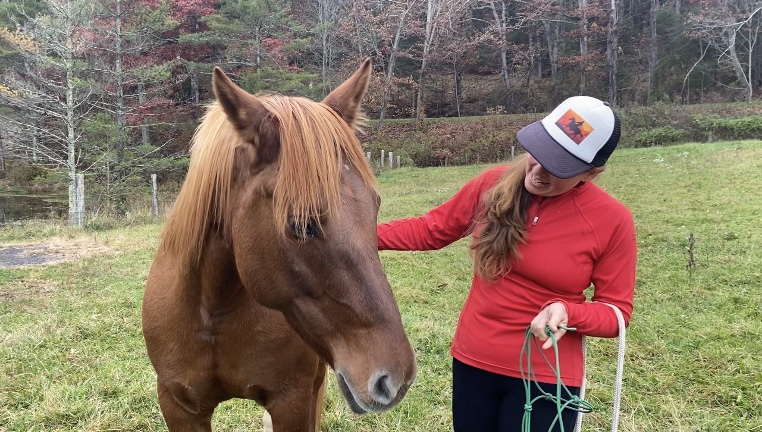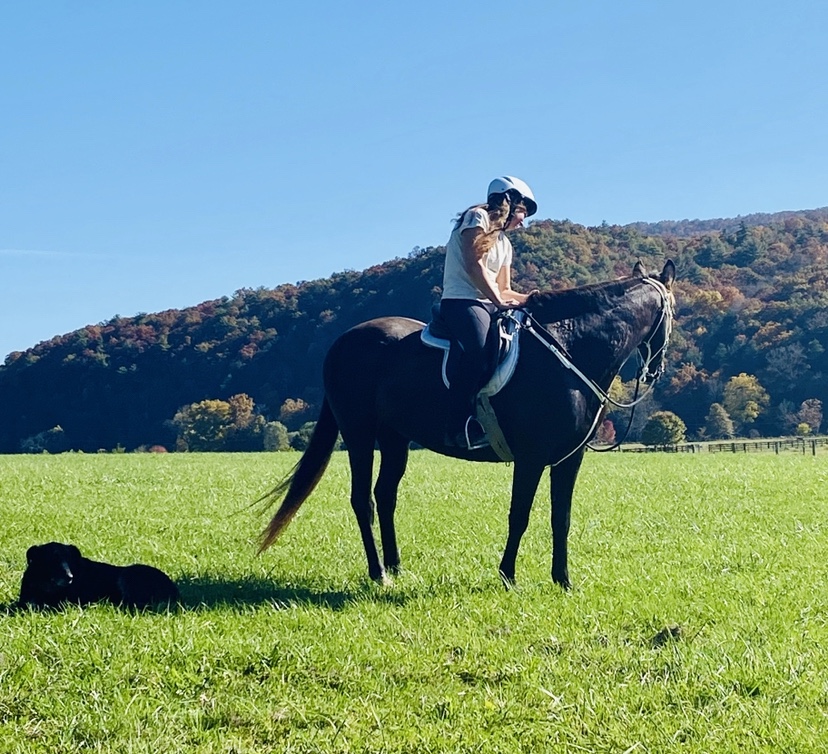I knew when I brought home Ireland (now Khaleesi) as a barely handled 4 year old that I didn’t want a horse that complied with what I wanted or needed out of fear or force. I wanted a willing horse who would choose to be my partner. I didn’t want a trained horse, I wanted something deeper than training.
I don’t want my horse to get trained because training is absolutely finite.
Buck Brannaman

In this journey I came to realize that to have the connection I wanted I didn’t need to become a horse whisperer, I needed to learn how to listen. The only way to deeper relationship is good communication, and this is impossible without listening. Probably the biggest challenge of this process that many people give up too soon is learning the language of the horse so you can become a horse listener.
There are good trainers out there training horses to know how to do what you need them to do. Trainers who can deliver a push button horse and show you how it works. The horse is an incredibly intelligent creature and can learn how to do this. As long as you stick to the manual you will do fine. The horse is also generous as a creature and will try to fill in for a human and get things done in the least stressful way possible. If you get stuck, adding enough pressure will usually result in getting somewhere even if it’s not elegant.
I’ve come to accept that in the horse world there are situations where this is acceptable and even preferable. But it’s hard for me to understand why anyone who realized there is more available would choose to stop there.
Imagine a marriage where there are acceptable topics and if you will agree to stick to those pleasantries over coffee in the morning then it will be fine… just don’t go off script.
Well. Actually I can imagine that.
I refuse to stay on the surface of a well trained horse. I want to be able to have that deeper relationship where she is safe to communicate to me even the things I don’t want to hear, and I will listen and try my best to respond in… love.
I don’t mean love as in I’m having a good day and feel good. I mean the kind of love that balances with truth and protects yet exposes and never quits. The love that puts my horse first above my timeline and above my goals for the day or the year. The love that will continue to examine myself and what’s revealed in me as I grow deeper with my horse.

Recently Khaleesi was fussing over being groomed sometimes I descend into ‘get it done’ mode so we can move to the real plan for the day… riding. She was getting nippy and pinning her ears. Instead of correcting her and telling her NO, QUIT THAT or worse putting her in cross ties, I slowed down and asked her.
What is it? What are you saying?
I gently rubbed her neck and stopped brushing. I looked at her and she calmed. Her eyes got softer. I began to brush more slowly and talked to her while I brushed. I watched her reaction. I gently worked some dirt patches out with intention and not just a quick groom to get onto the next thing. She lowered her head and completely changed.
This is one example of how my horse teaches me to pay attention and gives me an opportunity to honor her thoughts and feelings. She has both. In this case she felt like she was being hurriedly brushed at. She was being treated like an object to get cleaned. When I changed my approach she changed.

Not all horses are this way. My mustang mare loves the brushing and the rougher the better, it feels good and scratches all her itchy parts. The point of my story isn’t to change how you groom, but to consider in every step how your horse sees you and your approach.
Your relationship with each horse is unique. Just like your relationship to each child is unique or with your parents— unique to each of them.
If you want a deeper connection with your horse you must be willing to really listen. The biggest roadblock here is our assumptions that we know what they think or feel. What you do to your horse, it is likely you do with people too.

In this journey I observed something else: time, even a lifetime, spent around horses does not equal correct understanding of horse language. And I’ve met people around horses fewer years who have a better grasp on horse communication than some who have spent a lifetime.
What helps understanding is letting go of assumptions and taking the time to imagine every interaction is a conversation. When you begin to do this it can feel like talking to a 5-year old. You have to slow down and try to understand what they are asking. Sometimes the words aren’t quite what you’d expect and need some mental translation, sometimes it’s an odd question to bother with at the moment, sometimes you do have to say can we talk about that another time? This process in fullness is way more time consuming than most goal driven horse people have the interest for.
But if you consistently ignore the child and their concerns or ideas and never take the time to honestly listen, you will shut them down and they will learn you don’t want to know what they think or feel. Similarly if you don’t really listen and assume you know what they are asking you will never really get to know the real ‘them’.
The push button horse, how I am using the illustration, has been trained not to ask questions. They are trained to respond to a cue and do the thing in a timely fashion without questions about the thing. This horse has learned that humans do not want conversation they want results. One way you can recognize this horse the response is basically the same no matter who the horse is with. There is not much uniqueness in relationship to different humans. It is a learned response. Training.
I’ve sadly seen these horses called ‘good’ horses while horses that have more questions are considered ‘bad’ horses. Horses are really simply horses. I enjoy curious horses, horses that have a lot to say or ask, playful horses, horses that demand more from me and insist I grow and learn… even horses that respond in fear or disrespect are still just horses and especially in true dangerous disrespect- they have been led there by a human.
Push button horse is much more efficient at getting to your goals.
I also have goals, but that’s not why I have horses. If my horse seems to be unfit for my riding goals either by choice or limitation, I am finding a new goal, not a new horse. And I have been and continue to be faced with this question from time to time.

Someone else can train a horse, but if I am committed to listening it means I will have to learn and grow. Thankfully it’s a beautiful journey of getting to know my horse as she allows me in one layer at a time.
This is a vital point. Many horses I see are already well past shut down and not engaged in this process. Many horses learn not to share their thoughts or feeling or questions with a human because they are punished or corrected for it. This is often part of the training process. This is a way for humans to feel safe.
** it doesn’t necessarily mean the human IS safe, we like feeling safe or in control— often of much we are not**
Having a true push button horse usually means they don’t go off script either. They are trained not to.
I have seen that these horses can be drawn out. It takes time and it takes a human who is willing to do the drawing and engage in the questions even though it will slow down the pace of the day. It takes a willingness for the human to hear even if the new layers aren’t pretty at first. It takes a willingness to feel vulnerable and balance that with being a leader which is also vital in the process.
Listening to my horse- like listening to a 5-year old- doesn’t mean I take every idea and run with it. It means I honor the conversation even if I steer it in a new direction. I still must be the leader of the partnership.
Going off script and learning the process to communicate and connect can be scary. We do like predictability and stability, illusion of control. Deeper doesn’t feel safe, for us or the horse, at first. The truth can be sometimes that no, I don’t really want to know what you think about this. If we go there what I assume is all fine could unravel… in human and horse relationships. At least for me at times in both.

Listening to my horse, or other humans I am invested in, takes courage. We don’t always want to hear what they have to say.
It also reminds me of how God insists on working with us. Humans want a list of rules. We actually prefer the training method for ourselves too. Religion- especially religious systems- gives us traditions and regulations: give me the buttons God and I promise to do my best to push the right ones… if I do, you will then do your part and life will work out for me. I will be safe.
We also want a push button God.
But in the words of C.S. Lewis:
“Safe?” said Mr Beaver “Who said anything about safe? ‘Course he isn’t safe. But he’s good. He’s the King, I tell you.”
The Lion the Witch and the Wardrobe
God doesn’t want us to learn to push the buttons or be trained. He wants more from us: real relationship. He wants the heart. He wants to listen to us even though he knows everything already, and he wants us to learn to hear his voice too. (We become the child now with all the time consuming questions) Sure, God gives us some basic rules and guidelines but around 90% of our day doesn’t fall into those. If you are trying to decide what to do in the course of a day and it including killing someone, that’s a no go. Try again. Most of our decisions are more nuanced.
People complain about the ‘inconsistency’ of the Bible when often it is the struggle in how God is looking for us to walk with him in partnership not pushing the buttons. He wants to go off script into the wild layers of deep connection. It doesn’t feel safe. That’s why it takes trust and building faith. Small steps at first.
Same with the horses. Maybe don’t start today cantering bitless and bridleless in the big field and expect elegant dancing. Maybe begin with a conversation in the field before you halter? Maybe ask: hey, how are you feeling today? Before you put on the halter.

And then listen to what she says…


Thank you!!! ♥️♥️♥️ Absolutely love your blog. You’ve taught me a lot
LikeLiked by 1 person
It means a lot to hear you have gotten something out of it!
LikeLike
Listening is so Much harder than talking at our horse . Thanks for all the insights and the reminder to slow down and listen.
LikeLiked by 1 person